- Home
- Darrell Maloney
Without Warning
Without Warning Read online
NOWHERE
Book 1:
Without Warning
By Darrell Maloney
This is a work of fiction. All persons depicted in this book are fictional characters. Any resemblance to any real person, living or dead, is purely coincidental. Copyright 2019 by Darrell Maloney
This book is dedicated to:
Allison Chandler
Jennifer Lake
Stephanie Salinas
Thank you for correcting my blunders, fixing my mistakes and generally keeping me out of trouble…
-1-
December 12, 1250 hours local
In international waters 15 miles west of Hecate Strait, British Columbia
It was go time.
The Russian trawler Vostak Kursk had been following a north-south line for days along the Canadian shoreline, but keeping a respectable distance fifteen miles away from it.
For anyone watching, they were merely collecting halibut, an exceedingly ugly flatfish that Russians crave much more than Americans. Russians eat odd things such as halibut soup, halibut stew, and halibut gravy.
They’d probably make a halibut vodka if they could find a way to do it, so they could drink the stuff while eating it.
For several days they steamed back and forth, dragging their nets through the choppy waters of the north Pacific, keeping a steady pace of twenty knots.
One hundred miles or so south, then they’d come about and plot the same course north.
Were the Canadian Coast Guard watching they’d see nothing amiss. Just another one of a hundred Russian fishing boats in the region, plying its trade in international waters, minding its own business, making a living for its eight man crew.
A couple of things about that, though…
Canada doesn’t have a coast guard. At least not in the way Americans think of one.
Sure, they have a few boats along Canada’s Pacific coast to rescue an occasional inebriated sailor who fell overboard, or evacuate the crew of a vessel taking on water.
That’s assuming they can get there in time, for with only a few boats and crews to cover thousands of square miles of water they don’t always make it.
But they certainly try. And by trying they do serve a function, as small a force as they are.
One thing they certainly can not, and weren’t designed for, was to do what their name implies they do: guard the coast of Canada.
The crew of the Vostak Kursk knew this quite well.
The other thing about this seemingly routine fishing operation in international waters off the coast of British Columbia:
It was neither routine nor a halibut fishing operation.
It was much more sinister than that.
This vessel wasn’t fishing at all.
Oh, it looked like it was. It was meant to look that way.
The long nets the Vostak Kursk dragged behind it as it cut through the choppy seas at twenty knots only looked like nets.
The lines were real. It wouldn’t have appeared to be fishing if it didn’t have lines in the water. Even Russian fishermen are smart enough to know that.
It was the netting between the heavy lines… the part of the net that actually caught fish… which had been cut away.
The Vostak Kursk could steam its hundred mile course for a hundred years and catch nothing but plankton.
But to an outsider it sure looked like a legitimate fishing boat.
The Vostak Kursk had been in dry dock at a top secret military port in Vladistadt for almost seven months.
The altering of its nets was only one of the changes it undertook.
Many of the modifications were simple and cosmetic.
The massive sorting table, which in a normal operation was used by the crew to cull predator or dead fish before dumping the net’s load into the holding tanks… that was taken out completely.
It was reinstalled later. But only after a trap door was installed beneath it and hinges were installed.
The new table could be lifted up from one end to allow crew members, or anyone else for that matter, to crawl quickly in or out of the hold.
The holding tanks?
They were modified into crew quarters. Nothing fancy, mind you. Just comfortable enough to provide temporary living quarters for four hundred hardened and combat-ready Russian Spetsnaz (or special forces) troops.
Russia has no Marine Corps. It has a few hundred naval Special Forces troops who function in the same manner as American Navy Seals, but certainly not enough to conduct an operation of any magnitude. They were left in the motherland to protect the nuclear fleet from a possible counter attack.
With nothing equivalent to the United States Marine Corps or Navy Seals it fell to the Spetsnaz to fill the void beneath the decks of the Vostak Kursk. And as the vessel steamed back and forth in the north Pacific those four hundred troops were receiving their final instructions.
Make no mistake, the Spetsnaz were no slouches. They’d been combat-hardened in Syria and were killers one and all. Many had killed Americans, though many more bragged about that than actually did it. They were trained and trained again ad nauseam, and by the time they’d depart the Vostak Kursk’s bowels they’d be itching to kill again.
Major Leonid Konev was assigned to the four hundred troops in the ship’s hold. He was what the Russians call a “political commissar.”
But in reality his job had nothing to do with politics.
He was actually nothing more than a propaganda officer, and as such his main duty was to constantly reinforce the party narrative:
“You’re going into this with the best of intentions. Some of you may not come back, but your honor and your heroism will be felt back in Mother Russia, and your nation will be proud. Your family will honor your sacrifice and they in turn will be heroes in their communities.
“This mission is to preserve our homeland. You should feel honored to have a part in protecting our freedom.”
The troops bought it, as they always did. They’d been molded and brainwashed in the Russian tradition to believe the United States was a threat to them; that United States Marines would land on their shores at any time, rape their women and kill their children.
The truth was, Major Konev’s mission was to continue the brainwashing. And to insure that none of the troops deserted or malingered.
And to kill them if they attempted either.
-2-
In the wheelhouse of the Vostak Kursk, Captain Viktor Chevnofskiy yawned mightily.
Most people believe a yawn is a sign of boredom, of indifference, perhaps fatigue.
Any police detective or military interrogator knows better.
A yawn can mean all that innocuous stuff, sure.
But it can also mean something completely different: extreme stress, nervousness or guilt.
It’s one of the things they look for when questioning a suspect. Suspects who are guilty of evil deeds frequently start twitching. They get dry mouth and ask for something to drink. Then instead of drinking to quench their thirst they take an endless series of tiny sips that do nothing more than dampen their dry throat; the throat that’s dry because they know they’re guilty of something.
Then, they do something totally unexpected by the layman, and totally watched for by the detective who’s questioning them.
They start yawning and getting very sleepy.
The accused is usually surprised as well. For they’re stressed beyond belief. The last thing they could ever expect to do is to curl up in the corner and take a nap.
Almost invariably they play it off and consider the yawn as a good thing.
“This dumb cop will think I’m so relaxed I can’t possibly be worried about his stupid questions,” he’ll think. And additional
yawns, they believe, will be interpreted as confirmation of their innocence.
Cops know better. They know the yawns indicate the exact opposite. That they’re a strange and involuntary response to the tremendous stress the suspect is feeling.
Stress generated by guilt over the crime they committed, maybe. Or maybe not, for such miscreants seldom feel guilt or empathy for their victims. More likely it’s stress borne by the knowledge they’re guilty as hell. And not only that, but they know the detective also knows they’re guilty as hell.
So, in summary, a ferocious yawn doesn’t always mean one is calm and relaxed. Paradoxically, it frequently means the exact opposite. And on this particular early morning in the north Pacific Ocean, Captain Viktor Chevnofskiy was feeling quite nervous and quite stressed.
He placed two fingers on his neck, over his carotid artery.
His pulse was still racing.
He did everything he could to relax. He’d done his deep breathing exercises off and on since he stepped out of his bunk four hours before.
He’d switched to decaf three cups before.
It was like swigging water tinted black. It was worthless.
But he wanted to avoid his third heart attack and the mandatory retirement he knew would come with it.
If he survived, that is. He almost didn’t after the second one. One more, his doctor warned, and he’d be working in his vegetable garden the rest of his natural life.
The radioman burst into the wheelhouse and, without a word, handed the captain a top secret message from Moscow.
The unbridled excitement on the young yeoman’s face said it all. The captain didn’t have to read the message to know what it said, but he did anyway.
The message was short and sweet.
“Действуйте как запланировано.”
Three little words that would change the world.
“Proceed as planned.”
Captain Chevnofskiy dismissed the yeoman with a simple nod. No words were necessary.
Josef Stalin once said that the importance of any military operation could be gauged by the number of words it took to set it in motion. There were some campaigns which had the potential to change the course of a war. They were that important, and no one needed any explanation or motivation.
This was one such operation.
The yeoman understood. He came to attention, executed an immaculate about face and marched… not walked, but crisply marched, out of the wheelhouse and back to his station.
With every step he took he felt tremendous pride. For in his heart he knew that tonight was the beginning of the end.
Not for him or anyone he knew. But for the Amerikan bastards who for so long had hungered to invade Mother Russia and destroy her.
He understood that the much-hated Amerikans would soon come under control of the mighty Red Army. Amerika would at last be knocked off her high horse and brought down. Her citizens would be standing in bread lines. Many of them would be imprisoned in the massive gulags planned for Pittsburgh, Seattle and Phoenix. Hundreds of thousands would be locked up and essentially forgotten, for something they’d said or done toward their conquering Russian soldiers.
Or for hiding their weapons after being ordered to turn them over to Soviet authorities.
It was said that up to twenty percent of Americans would commit suicide rather than live under Soviet rule.
That was fine with Ivan, the proud yeoman radioman.
Far fewer troublemakers to have to deal with, by his reckoning.
Another twenty percent were expected to die during the “Fall of Amerika,” as Moscow was calling the campaign.
Good riddance to them as well.
The rest would fall into line.
They’d willingly become slave laborers who’d build the gulags and feed the occupying soldiers.
They’d curry favor with the Russians by ratting out their neighbors who still had firearms, or who’d secretly joined the rebels.
The Amerikans who were left would be exposed not as what they wanted the world to believe they were: proud patriots and benefactors.
The world would finally see them as they really were: frightened little rats scurrying in all directions to save themselves.
Ivan, the radioman, believed all these things because he was told to believe them.
Major Konev and a thousand other political commissari did their jobs extremely well.
After all, when one repeats the same tired propaganda bullshit often enough it ceases to be a lie and becomes accepted fact.
At least for the zealots, the gullible and the weak minded.
-3-
Captain Chevnofskiy reached for the ship’s phone and placed two calls.
The first was to Colonel Dmitry Sagalevich, commander of the elite group quartered twenty feet beneath him.
“Colonel, this is the captain. We have been ordered to proceed as planned.”
The colonel breathed a huge sigh of relief.
His greatest fear to that point was that the campaign would be called off for political reasons.
The politburo had been secretly debating in recent months, and was divided into two distinct camps.
One camp argued that since the United States now had an administration which was friendly to the Soviets for the first time in three generations, an operation as massive as the “Fall of Amerika” might not be needed.
“Why suffer such a tremendous loss of life if it’s not necessary?” they said. They were referring not to the loss of American lives, for they couldn’t care less about such frivolity.
Instead they worried about the lives of the Russians and the Chinese and the North Koreans who were planning to invade the United States.
“With a friendly administration in power in Washington we can take over the country from the inside. We can hype tourism and encourage Russians to visit by the millions, all over the United States. We can infiltrate their country with hundreds of thousands of crack commandos. We can provide them with false identity papers and disperse them all over the country, where they can form sleeper cells and go dormant until we need them.
“Then they can go active and commit terrorist acts which we can blame on the Muslims. When they go after the Muslim nations we can subvert them from within. Get people we favor in office. Then lead them like a child through the park into granting policies favorable to us. It’ll be like taking candy from a baby.”
The other camp, the much more hawkish one, was tired of waiting.
“Amerika is softer now than they’ve been since their isolationist years before the Great European War of the 194 0s. We need to strike now before Washington changes hands again and they go back to building up their military instead of just talking about it.”
Colonel Sagalevich had been worried the first camp would win out. And that the Fall of Amerika would come to a screeching halt just before it began.
But that wasn’t the case.
The graying colonel smiled.
His father was a decorated hero during the Soviet War in Afghanistan. His grandfather a hero in the battle of Stalingrad during the Great European War. His grandfather led the last battalion into the battle of Berlin. He had plans to take the German Chancellery, and he told his men to capture Hitler alive.
He wanted to be the lucky man who wrapped his hands around Hitler’s throat and squeezed the life out of him.
It wasn’t meant to be. Hitler escaped the carnage of Berlin and was smuggled to the coast of Norway, where he traveled aboard submarine U-977 to Argentina.
That wasn’t what the world was told, of course. Hitler left behind the burned body of a man two inches taller than himself with a different facial bone structure, in the hopes the allies would believe he’d committed suicide.
Hitler was insane and lacked any sense of humanity. But he was successful because he had an uncanny ability to understand human nature.
He knew what words to use to put his followers into a trance-like st
ate and line up to follow him as he destroyed their country and much of the rest of Europe to boot.
He also knew that his people, as well as the allies, did not share his endless bloodlust. That they would eventually tire of war and would look for a way out of it.
He understood that given even the flimsiest of circumstantial evidence he was dead the allies would yell “hallelujah!” and run for the exit doors. Despite a good deal of evidence the burned corpse was a body double and not Hitler himself, the allies let him escape.
They’d lost enough men already, they decided. No sense throwing good money after bad.
The world already thought he was dead. No sense rocking the boat.
A very odd thing happened after the close of World War II.
German citizens, every single one, swore that they never followed Hitler’s cause.
Their neighbors were good and loyal Nazis, they all claimed. Their friends and those family members who were killed were good and loyal Nazis.
But not them. Certainly not them.
Of course that didn’t jive with the archival footage of Hitler standing in an open convertible, rendering a Nazi salute as he drove slowly through the streets of German bergs.
Crying women threw flowers to him and men knocked one another down in an effort to get closer to their glorious leader.
Not some of them. Not most of them.
All of them.
The masses would buy anything if it was something they wanted. Just like the world was willing, in the spring of 1945, to let Hitler get away and live out his life in obscurity, the Russian people would believe the attack on Amerika was just and imperative.
And they’d also believe that now was not only the logical time for the attack, it was really the only time. For they’d be told over and over again the United States was planning a sneak attack on the Motherland. The only way Mother Russia would survive was to make the first strike. To beat them to the punch.
To wipe out the Amerikans before the Amerikans could do the same to them.

 A Perilous Journey
A Perilous Journey The Yellowstone Event: Book 6: The Aftermath
The Yellowstone Event: Book 6: The Aftermath Eden Bound
Eden Bound Without Warning
Without Warning Everything Has Changed
Everything Has Changed Rest in Peace
Rest in Peace This Changes Everything
This Changes Everything The Final Chapter
The Final Chapter It Can't Be Her
It Can't Be Her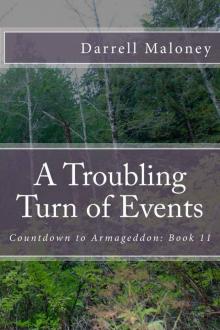 A Troubling Turn of Events
A Troubling Turn of Events The Blockade
The Blockade A Tearful Reunion
A Tearful Reunion Countdown to Armageddon
Countdown to Armageddon Alone, Book 3: The Journey
Alone, Book 3: The Journey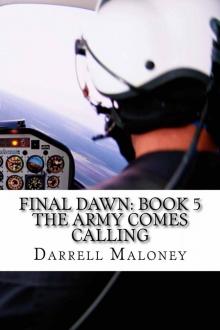 The Army Comes Calling
The Army Comes Calling The Grim Reaper Comes Calling
The Grim Reaper Comes Calling Her Name is Beth: Alone: Book 5
Her Name is Beth: Alone: Book 5 Red: The Adventure Begins
Red: The Adventure Begins Rise From The Ashes: The Rebirth of San Antonio (Countdown to Armageddon Book 3)
Rise From The Ashes: The Rebirth of San Antonio (Countdown to Armageddon Book 3) An Unkind Winter (Alone Book 2)
An Unkind Winter (Alone Book 2)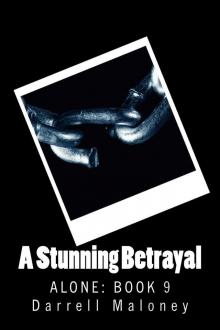 A Stunning Betrayal: Alone: Book 9
A Stunning Betrayal: Alone: Book 9 A Whole New World: Ranger: Book 2
A Whole New World: Ranger: Book 2 Return To Ely
Return To Ely A Lesson Learned: Red: Book 3
A Lesson Learned: Red: Book 3 The Homecoming: Countdown to Armageddon: Book 5
The Homecoming: Countdown to Armageddon: Book 5 Final Dawn: Book 12: Where Could He Be?
Final Dawn: Book 12: Where Could He Be? An Acquired Taste
An Acquired Taste On Desert Sands: Alone: Book 6
On Desert Sands: Alone: Book 6 The Battle: Alone: Book 4
The Battle: Alone: Book 4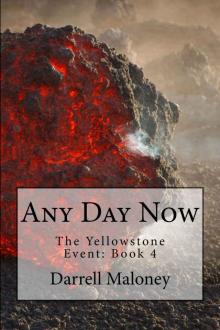 Any Day Now
Any Day Now Too Tough To Tame: Red: Book 2
Too Tough To Tame: Red: Book 2 No Help From Austin: Red: Book 5
No Help From Austin: Red: Book 5 An Unwelcome Homecoming
An Unwelcome Homecoming A New Start: Final Dawn: Book 9 (Volume 9)
A New Start: Final Dawn: Book 9 (Volume 9)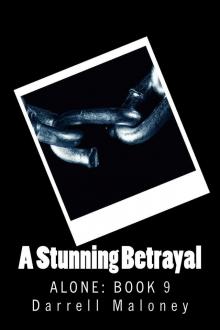 A Stunning Betrayal
A Stunning Betrayal An Undeclared War (Countdown to Armageddon Book 4)
An Undeclared War (Countdown to Armageddon Book 4) One of Our Own: Final Dawn: Book 11
One of Our Own: Final Dawn: Book 11 Texas Bound: Alone: Book 11
Texas Bound: Alone: Book 11 Payback: Alone: Book 7
Payback: Alone: Book 7 The Quest: Countdown to Armageddon: Book 6
The Quest: Countdown to Armageddon: Book 6 The Siege
The Siege The Yellowstone Event: Book 1: Fire in the Sky
The Yellowstone Event: Book 1: Fire in the Sky Return to Blanco (Red Book 4)
Return to Blanco (Red Book 4) The Search
The Search AFTER THE DUST SETTLED (Countdown to Armageddon Book 2)
AFTER THE DUST SETTLED (Countdown to Armageddon Book 2) Death Comes Calling (Ranger Book 3)
Death Comes Calling (Ranger Book 3) A Long Road Back: Final Dawn: Book 8
A Long Road Back: Final Dawn: Book 8